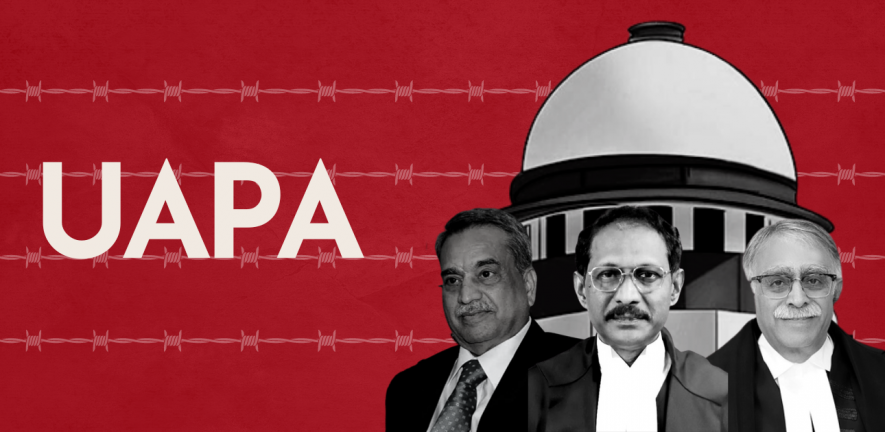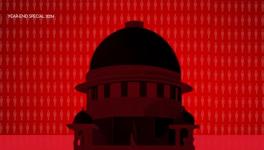SC Overturns its own Decade-old Law, Says Membership of Banned Organisation an Offence

Representational Image.
A three-judge bench overruled three decisions by a two-judge bench delivered twelve years ago that had held that mere membership of banned organisations is not in itself an offence, and that the member must have engaged in violence, incitement to violence, or creating disorder or disturbance to public peace in order to be penalised.
—-
A three-judge bench of the Supreme Court on Friday overruled three decisions rendered by a two-judge bench of the court in State of Kerala versus Raneef (2011), Arup Bhuyan versus Union of India (2011) and Sri Indra Das versus State of Assam (2011) which had held that mere membership of a banned organisation under the now-lapsed Terrorists and Disruptive Activities (Prevention) Act, 1987 (TADA) and the Unlawful Activities (Prevention) Act, 1967 (UAPA) would not incriminate a person.
In the decisions which have now been overruled, the division bench of Justices Markandey Katju and Gyan Sudha Mishra had advanced the principle that to incriminate a person for the membership of a banned organisation, there should be more than the mere factum of membership; they must resort to violence or incite people to violence, and do an act intended to create disorder or disturbance of public peace by resorting to violence.
On Friday, a three-judge bench comprising Justices M.R. Shah, C.T. Ravikumar and Sanjay Karol held that the division bench could not have read down the provisions of the TADA and the UAPA to mean that over and above the membership of a banned organisation, there must be an overt act and/or further criminal activities, thereby adding the element of mens rea.
The bench was answering a reference made to it in the aftermath of the division bench decisions.
In Raneef, which involved the UAPA, the division bench had agreed with the United States (US) Supreme Court decision in Elfbrandt versus Russell (1966), which had rejected the doctrine of ‘guilt by association’.
Following Raneef, the same bench in Arup Bhuyan, while acquitting the appellant, had read down Section 3(5) of the TADA to mean that mere membership of a banned organisation would not be an offence unless the (accused) member resorts to violence or incites people to violence, or creates public disorder by violence or incitement to violence. The same reasoning was followed in the decision rendered in Sri Indra Das.
The Union Government had filed a review petition, contending that the validity of Section 10(a)(i) of the UAPA was not under challenge in the cases decided by the division bench; moreover, the government was not even heard while reading down the impugned provision of the UAPA.
Therefore, the issues before the three-judge bench were:
- Whether Raneef and Arup Bhuyan had been correctly decided, and whether “active membership” is required to be proven over and above the membership of a banned organisation under the UAPA.
- Whether the American decisions concerning freedom of speech referred favourably to in Raneef by the two-judge bench could have been relied upon while considering the right to freedom of speech available under the Constitution of India, more particularly Article 19(1)(c)and 19(4) of the Constitution.
- Whether the two-judge bench was justified in reading down Section 10(a)(i) of the UAPA without impleading the union government as a party, and more particularly, when the constitutional validity of the provision was not called in question.
Answering the reference, the Justice Shah-led three-judge bench unanimously held that the two-judge bench could not have read down Section 10(a)(i) of the UAPA without hearing the union government’s side.
“When any provision of parliamentary legislation is read down in the absence of the Union of India, it is likely to cause enormous harm to the interest of the State,” the bench held in the primary judgment, authored by Justice Shah on behalf of the bench.
It added that “in absence of any challenge to the constitutional validity of Section 10(a)(i) of the UAPA there was no question of reading down the said provision by this court.”
On the question of whether the two-judge bench was justified in following US Supreme Court judgments, the bench held that there are structural differences between the Constitution of India and the US Constitution. It added that the freedom to form associations or unions under Article 19(1)(c) of the Indian Constitution is subject to reasonable restrictions under Article 19(4), which permits the Parliament to frame laws, taking into consideration public order and/or the sovereignty of India.
The three-judge bench thus ruled that without noticing the differences between American laws and Indian laws, the two-judge bench in Bhuyan and Raneef erred in straightway and directly following the US Supreme Court decisions, that too without adverting to the differences and the position of law in India.
In a separate concurring judgment, Justice Karol dealt specifically with the distinction in law on the impugned issue between India and the US, and the application of American judgments by the division bench in the three judgments in question. He noted that while Article 19 of the Constitution of India empowers the State to reasonably restrict the freedoms enumerated in Article 19(1), there is no such parallel provision in the US Constitution empowering the American legislature to restrict rights under the First Amendment of its Constitution and it is only the US judiciary that can impose such restrictions.
He observed that “there is nothing in the American Constitution corresponding to clauses (2) to (6) of Article 19 of the Indian Constitution.”
The bench, however, clarified that it did not mean that in a given case, the US Supreme Court decisions may not be taken into consideration and/or may not be used for guidance.
“Before following the American decisions, Indian Courts are required to consider the difference in the nature of the laws applicable in the respective countries,” the bench clarified.
Justice Karol, in his judgment, also points out that “it is not membership of political organizations etc. or free speech or criticism of the government that is sought to be banned, it is only those organizations which aim to compromise the sovereignty and integrity of India and have been notified to be such and unlawful, whose membership is prohibited.”
The bench also upheld the validity of Section 10(a)(i) of the UAPA, which criminalises mere membership of a banned organisation, punishable with imprisonment for a term which may extend to two years and may also incur a fine.
It noted that the object and purpose of the enactment of the UAPA is to provide for more effective prevention of certain unlawful activities.
“To punish such a person who is continued as a member of such unlawful association which is declared unlawful due to unlawful activities can be said to be in furtherance of providing for effective prevention of the unlawful activities. Therefore, as such Section 10(a)(i) which provides that where an association is declared unlawful by a notification issued under Section 3 which has become effective under sub-section 3 of that Section, a person who is and continues to be a member of such association shall be punishable with imprisonment for a term which may extend to two years and shall also be liable to fine, can be said to be absolutely in consonance with Article 19(1)(2) & (4) of the Constitution of India and can be said to be in furtherance of the object and purpose for which the UAPA has been enacted,” the judgment underscored.
It also rejected the argument that Section 10(a)(i) suffers from vagueness. It held, “A person who is a member of such an unlawful association is as such aware of the declaration of such association as unlawful and despite the same if he still continues to be the member of such unlawful association which is indulging into the unlawful activities and acting against the sovereignty and integrity of India, his intention is very clear that he still wants to associate with such an association which is indulging into ‘unlawful activities’ and acting against the interests of sovereignty and integrity of India. The language used in the Section 10(1)(i) and the procedure to be followed under Sections 3 & 4 of the Act, before any association is declared as unlawful are very clear. There is no vagueness at all… Therefore, Section 10(a)(i) does not suffer from any vagueness and/or on the ground unreasonable and/or disproportionate.”
The bench has thus held that once an association is declared unlawful, any person who was a member of the association and continues to be a member demonstrates a conscious decision on their part to be part of an unlawful association; therefore, they are liable to be penalised for such an act of continuation of their membership of such unlawful association.
It, however, clarified, that if a person has been a member of an organisation before it was banned, but leaves its membership after its declaration as unlawful under Section 3 of the UAPA, they will not attract Section 10(a)(i).
Get the latest reports & analysis with people's perspective on Protests, movements & deep analytical videos, discussions of the current affairs in your Telegram app. Subscribe to NewsClick's Telegram channel & get Real-Time updates on stories, as they get published on our website.
























